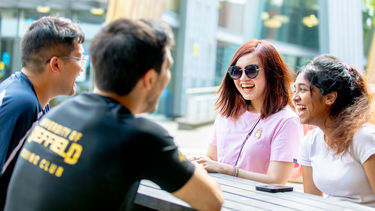My experience of moving to online learning
Tabitha Malcolm, second year BA East Asian Studies students, reflects on her experiences of studying with us in SEAS during 2020 and the challenges of adjusting to online learning.

Hurriedly packing to leave my Endcliffe flat, scared of being stranded at University in a rumoured national lockdown, is something I don’t think I will ever forget. I remember two of my flatmates sitting on my bedroom floor, watching solemnly as I carelessly chucked clothes and books into a suitcase. Eventually, one of them said with forced optimism, “I’m sure we’ll all be back after Easter.” If only that had been the reality.
My experience of online learning has been largely positive, massively aided by my department. From the beginning of facility closures in ∫˘¬´”∞“µ that signalled greater changes to come, The School of East Asian Studies was in frequent contact with students and meeting with Student Council members to tackle the shift online. While the road was rocky and it took time to iron out initial issues with online learning, I felt in the loop and heard. Knowing that my department was doing everything possible to create a stable online learning environment took the pressure off me to chase information and allowed me to focus on adjusting.
The difference between online learning then and now, with the University being prepared for a blend of face-to-face and online teaching, is impressive. I remember in the initial shift having to take several deep breaths before logging into my first Blackboard collaborate sessions. It was awkward and daunting, and sometimes still is now, but over time, it became easier to relax and to join discussions as I would in a regular class. By the time September came around, I felt prepared. I had been able to formulate an online routine that works for me, so instead of running in blindly to second year, I had a better idea of what to expect.
Routine and structure are things that I believe to be key to adapting to online learning. Typically, I will wake up at 8am, get ready, have breakfast, and then create a checklist for the day. I find if I stay in my pyjamas, I just fall asleep again, but remaining in the habit of getting ready makes me feel ready. I work through my checklist, which I try to keep as realistic as possible, and attend online classes where available. In fact, being able to work through content at my own pace throughout the week has given me more time to focus on reading than I did before. I try to keep a scheduled lunch and dinner time, and avoid working beyond 8pm. It can be tempting to just keep working to get through set readings and pre-recorded lectures but, having personal downtime and a healthy sleeping pattern is vital to approaching online learning successfully.
I believe that I am very lucky that the School of East Asian Studies has been so understanding of students’ individual circumstances, ensuring that not being able to attend synchronous sessions has no detriment attached. While I am fortunate to not have any care or employment responsibilities, this has massively taken pressure off to assure perfect attendance – especially when the WiFi in my flat was broken for over a month. In fact, when I contacted SEAS about this issue in particular, I received a very sympathetic response and was signposted to where I could apply for a University-issued dongle. This kind of support has made online learning much smoother.
During reading week and over Christmas, SEAS organised online events including games, cooking tutorials and quizzes, and sent out a virtual recipe book to keep students engaged and social. I don’t know of any other department that has been so committed to student wellbeing and communication, and myself and many other students are so grateful for their support.
Tabitha Malcolm
Undergraduate student
Needless to say, online learning is not the same as traditional lectures and seminars, but I have still been able to build good relationships with my lecturers and classmates through ‘chatting time’ that is often allocated to the first few minutes before the start of an online class, by email, and via social media. I have found that as staff also miss face-to-face interaction, there is a shared determination to replicate normality as closely as possible. This spirit has been very encouraging and mood boosting at times when university life has felt lonelier than before.
As heart-breaking as it was to leave my friends and flatmates behind in March 2020, unsure of when I would see them again or what the future held, the shift to online learning from April was a step toward normality in otherwise highly unprecedented times. While the word ‘unprecedented’ has been exhausted by politicians, adverts and universities alike, I believe it’s an important word to remember – even almost a year later. Remembering that current circumstances are not normal is a gentle, even if unwanted, reminder that working towards a degree in such times is something in itself to be proud of. And so, while online learning has its moments of frustration and loneliness, it’s a change that has the potential to offer unique flexibility and is not always something to dread.

International scholarships
We offer a generous package of financial support for international students, including undergraduate and postgraduate taught scholarships worth £10,000 towards the annual tuition fee.
Applications are open for existing offer holders for programmes starting in autumn 2025.

